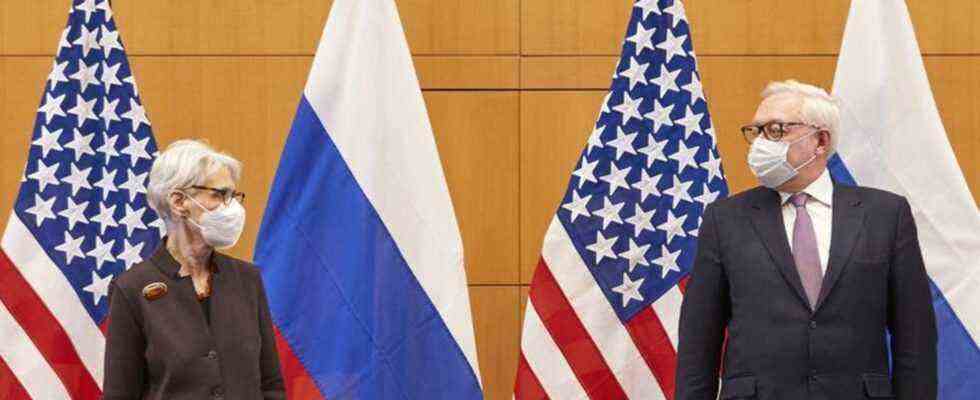NATO-Russia Council
Ukraine crisis: USA sees no de-escalation ahead of NATO meeting
US Deputy Foreign Minister Wendy Sherman and Russia’s Deputy Foreign Minister Sergei Ryabkov at a bilateral meeting. Photo: Denis Balibouse / KEYSTONE REUTERS POOL / dpa
© dpa-infocom GmbH
Bilateral negotiations between the USA and Russia have not produced any concrete results for solving the Ukraine crisis. Talks at NATO are now entering the next round.
Representatives of the 30 NATO countries and Russia will meet in Brussels this Wednesday to discuss the Ukraine conflict and other current issues.
The expectations of the meeting are low, but the formation of the so-called NATO-Russia Council is considered positive. It is the first time since July 2019 that both sides have held talks in this format. Before the meeting, the US criticized that Moscow was still not trying to ease the tension in the Ukraine crisis.
It is expected that Russia will primarily promote new security agreements during the talks. From Moscow’s point of view, these should include, among other things, NATO’s waiver of further expansion and, in particular, of including Ukraine. The US has repeatedly ruled out such a commitment. Not a single one of the allies is ready to put NATO’s “open door policy” up for negotiation, said the US ambassador to the defense alliance, Julianne Smith.
Above all, NATO is likely to demand an end to the Russian troop deployment near Ukraine. According to Western intelligence services, this is related to Moscow’s demands and is intended to fuel fears of a Russian invasion of Ukraine in order to persuade NATO to make concessions. The Foreign Office said that State Secretary Andreas Michaelis would attend the meeting in Brussels for Germany.
USA: No signs of de-escalation
According to US data, Russia has now drawn around 100,000 soldiers near the Ukraine. US Ambassador Smith told the US broadcaster CNN that it is assumed that Russia wants to move more troops to the border. There are currently no “clear signals of de-escalation” from Russia.
The Ministry of Defense in Moscow announced that it had relocated around 3,000 soldiers and military equipment for exercises in areas not far from the Ukrainian border. The maneuvers are to be held in the Voronezh, Belgorod and Bryansk regions, among others.
Smith underlined the solidarity of the allies in a telephone line with journalists. NATO is striving for a dialogue with Russia, but is unanimous against threats from Moscow. “Should Russia take the path of confrontation and military action, we have made it clear to the Kremlin that we will react decisively.”
«Moment of truth»
For the Russian government, among others, Deputy Foreign Minister Alexander Gruschko is expected to attend the meeting at NATO headquarters. “We will strive for a concrete and substantial answer to the Russian draft security agreements,” said Grushko before the departure in Moscow, according to the Interfax agency. He expects “serious and profound” conversations. It is said to be about “fundamental problems of European security”, which the NATO countries have glossed over for many years and dismissed as unimportant. “It is not an exaggeration to say that the moment of truth has come.”
The NATO states are represented by their ambassadors to the military alliance or by representatives from the capital cities. For the United States, Vice Secretary of State Wendy Sherman wants to take part in the talks. Sherman already led the US delegation in bilateral talks with Russia in Geneva on Monday. There were no concrete results, but they were also seen as a possible step towards a longer dialogue. On Thursday there will also be talks on the Ukraine conflict in the Permanent Council of the Organization for Security and Cooperation in Europe (OSCE) in Vienna.

